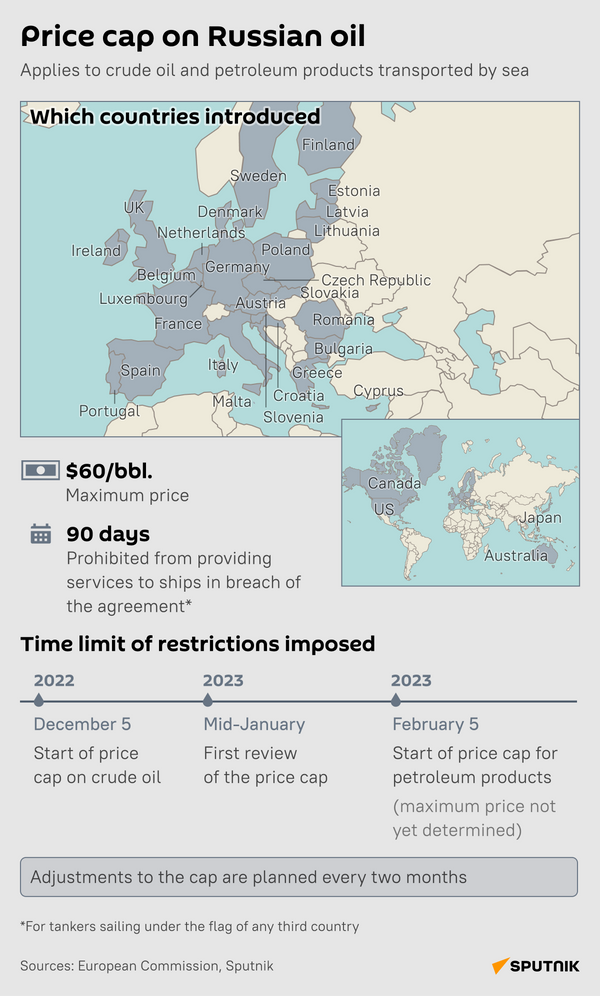https://sputnikglobe.com/20221207/free-market-for-me-not-for-thee-which-countries-adopted-price-cap-on-russian-oil-1105111200.html
Free Market for Me, Not for Thee: Which Countries Adopted Price Cap on Russian Oil
Free Market for Me, Not for Thee: Which Countries Adopted Price Cap on Russian Oil
Sputnik International
The US, Britain, and the EU started rolling out sanctions against Russia after the start of the special op in Ukraine this February. Several rounds of... 07.12.2022, Sputnik International
2022-12-07T13:26+0000
2022-12-07T13:26+0000
2022-12-08T16:22+0000
infographic
energy crisis in europe
russia
oil
oil price
sanctions
2022 russian oil price cap
https://cdn1.img.sputnikglobe.com/img/07e6/0c/06/1105110704_0:0:1280:720_1920x0_80_0_0_c3c93b6ce209fefb3ccdedf8a19836f9.png
On December 5, a price cap on Russian oil came into effect. The controversial step was adopted by the G7 nations, the EU (which is closely associated with the Group of Seven) and Australia, setting the maximum price at $60 per barrel. The cap is to be reviewed every of month to remain at 5 percent below the International Energy Agency (IEA) benchmark.The restrictions approved by the West have several exemptions: the sanctions do not apply to pipeline supplies of crude, which are sent to Europe from Russia via the Druzhba pipeline. The Sakhailin-2 oil and gas project, which includes Japan, is also off the sanctions list.While the European Union, Britain, the US and their allies have imposed a restriction on the Russian oil, Moscow has significantly boosted its fuel deliveries to other countries, such as India and China. Russian authorities stressed they won't accept the price cap and would be only selling oil to those nations that are ready to trade with Russia according to market conditions.Reports suggest that Moscow is now considering several responses, including a full-scale ban on crude oil sales to the countries that approved the cap, or ban on any contracts that include oil price cap-related clauses.
2
russia
Sputnik International
feedback@sputniknews.com
+74956456601
MIA „Rossiya Segodnya“
2022
Sputnik International
feedback@sputniknews.com
+74956456601
MIA „Rossiya Segodnya“
News
en_EN
Sputnik International
feedback@sputniknews.com
+74956456601
MIA „Rossiya Segodnya“
Sputnik International
feedback@sputniknews.com
+74956456601
MIA „Rossiya Segodnya“
russian oil, price cap, sanctions, oil market, g7
russian oil, price cap, sanctions, oil market, g7
Free Market for Me, Not for Thee: Which Countries Adopted Price Cap on Russian Oil
13:26 GMT 07.12.2022 (Updated: 16:22 GMT 08.12.2022) The US, Britain, and the EU started rolling out sanctions against Russia after the start of the special op in Ukraine this February. Several rounds of restrictions seriously destabilized energy markets and led to skyrocketing prices worldwide. Now, they are trying to add even more sanctions, attempting to force Russia to sell its oil cheap.
On December 5, a price cap on Russian oil came into effect. The controversial step was adopted by the G7 nations, the EU (which is closely associated with the Group of Seven) and Australia, setting the maximum price at $60 per barrel. The cap is to be reviewed every of month to remain at 5 percent below the International Energy Agency (IEA) benchmark.
The restrictions approved by the West have several exemptions: the sanctions do
not apply to pipeline supplies of crude, which are sent to Europe from Russia via the
Druzhba pipeline. The Sakhailin-2 oil and gas project, which includes Japan, is also off the sanctions list.
While the European Union, Britain, the US and their allies have imposed a restriction on the Russian oil, Moscow has significantly boosted its fuel deliveries to other countries, such as India and China. Russian authorities stressed they won't accept the price cap and would be only selling oil to those nations that are ready to trade with Russia according to market conditions.
Reports suggest that Moscow is now considering several responses, including a
full-scale ban on crude oil sales to the countries that approved the cap, or ban on any contracts that include oil price cap-related clauses.



